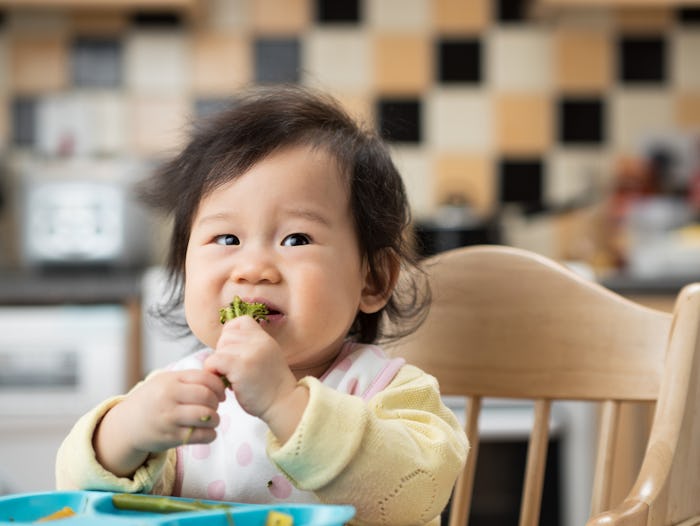Life
Turns Out, A Vegetarian Diet Might Not Be The Best Choice For Your Baby
As long-time vegetarian, I always assumed my baby would be a vegetarian too. But after a year of parenting, I've realized babies aren't simply tiny humans, but another sort of creature entirely. They require 12 hours of sleep (not counting naps), near-constant attention, and bundles of equipment for proper care and maintenance. What does my little alien really need from her nutrition, and is it safe for her to eat only plant foods? Can my baby be a vegetarian, or should I hold off on introducing my own diet to her?
As it turns out, a baby's iron requirements are out-of-this-world high — we're talking greater than a grown man's. Alice Callahan, Ph.D, author of The Science of Mom: A Research-Based Guide To Your Baby's First Year, explains to Romper that iron is crucial to a baby's development. Severe iron deficiencies can lead to early childhood anemia, which in turn can impair cognition and motor skills. Unfortunately, it's really difficult for babies to meet their iron needs, and many babies would be iron deficient if it weren't for fortified cereals. Even breast milk, which is such a fantastic food for infants, can't help on that score. "Breast milk is really low in iron, which is fine for about the first 6 months of life," Callahan writes in an email interview with Romper. "But after that, you need good food sources of iron to round things out for a breastfed baby."
But wait — don't plant foods contain iron, too? While whole grains and legumes technically contain quite a bit of iron, they also contain compounds that make iron less available when you get down to digesting. Basically, your baby can't absorb as much iron from kale as she does from beef pilaf. Low bioavailability of iron in plants and grains is part of the reason the American Academy of Pediatrics now recommends meat as an important first food. Because iron is so critical for a quickly-growing baby, Callahan advises all parents ask their pediatrician to check their baby's iron levels at 9 to 12 months of age.
According to a 2012 study in the Journal of Nutrition, ensuring your baby gets enough iron and zinc is more challenging than you might think. Researchers tested the iron levels of breastfed babies who also ate beans, eggs, chicken or fish, greens, and a grain each day. Astoundingly, those babies only managed to get 30 to 50 percent of their daily iron requirement on that diet. Just to reiterate: even when eating meat, these babies weren't getting the iron they needed for proper growth. In the U.S., fortified cereals keep most infants from falling short. In developing countries, the situation is more serious.
"Baby food companies have done a really good job of convincing us that baby cereal and puréed fruits and vegetables are all babies need, and that's become the 'traditional' way of feeding babies," explains Callahan. As long as you supplement with iron-fortified grains, that's not a problem. But Callahan notes that there are many reasons not to rely on processed cereal. "For one thing, some babies don't like it — they don't like the taste, or they want to feed themselves, not be fed with a spoon," she notes. She goes on:
"I think more parents are interested in feeding their babies whole foods, but they may not have gotten the message that they have to pay attention to nutrients like iron and zinc. Even a few bites of meat can give babies a real boost in these nutrients."
Especially if breastfeeding, parents who eschew iron-fortified cereals should strongly consider including fish and meat in their baby's diet, Callahan explains. Parents feeding their babies formula don't have to worry as much in the first year, because formula is also fortified with iron.
My family is vegetarian, but I feed the baby a bit of meat, fish, or egg each day. (I'm not a huge fan of doing this, but she just transitioned from formula to whole milk, which means she's lost an impotant iron source. She also dislikes cereals, and we've tried just about all of them.) Personally, I don't think I can meet her nutritional requirements with plant-based foods alone, but every vegetarian family will handle their baby's diet differently. If you're passionate about raising your baby or toddler on a completely vegetarian diet, your pediatrician is your best resource.
Of course, food is about more than basic nutrients. Feeding your baby is always an amazing opportunity to connect with her as she learns more about her world. "Sit down to share the meal with her," advises Callahan. "Let her try things, and let her decide to have more of this, less of that, and when she's all done."
This year's Thanksgiving, my baby may be the only family member eating actual turkey, but I'm excited to see her face when she tries the sweet potatoes, the Tofurkey, and the cranberry sauce, too.
Check out Romper's new video series, Romper's Doula Diaries:
Watch full episodes of Romper's Doula Diaries on Facebook Watch.
